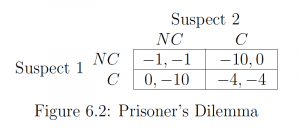Game Theory in Nuclear War
Link: https://www.washingtonpost.com/news/wonk/wp/2017/08/16/what-game-theory-tells-us-about-nuclear-war-with-north-korea/
Last week, we learned about game theory in relation to how actors make decisions and what considerations they make when they take action. We learned about this through the prisoner’s dilemma at first, where prisoners had a dominant strategy and made decisions according to what the other party would choose. We also learned about mixed strategies, where there weren’t outcomes that were guaranteed and the actions of a party depended on the probability and expected payout of different strategies. In particular relation to the Prisoner’s Dilemma, this concept of game theory can be applied to geopolitical affairs- particularly nuclear relations.
In the Prisoner’s Dilemma, one prisoner can effectively betray the other partner and get the shortest sentence, however, if both betray each other they both get far worse sentences than if they were to just stay silent. This article makes a very interesting relation- it compares this Prisoner’s Dilemma to nuclear war in that one country can attack instead of not attacking just as a prisoner can betray another. However, it adds in the interesting detail of future retaliation. In the prisoner’s dilemma, once the decision is made both prisoners are stuck with the consequences with no change. However, in the context of nuclear war between the US and North Korea, their decision has future implications which change the calculus of both countries. This creates the prevalence of a repeated prisoner’s dilemma, where the U.S. and North Korea face the decision of attack or not attack every day, and their decisions affect how they will act in the future. Rather than simply choosing betray or stay silent, both these countries see a new piece to the puzzle every day, and this is compounded upon by the complex nature of political relations and other political actions.
At the same time, this shows how important game theory can be and the implications it has for the world. While the prisoner’s dilemma depicts a simple game between two prisoners, game theory can be extrapolated to how countries act, how decisions are made, and how massive geopolitical tides are turned. This becomes even more interesting when factoring in the concept of common knowledge and also relationships with other countries. On the aspect of common knowledge, both countries don’t have perfect information and there are so many different pieces of information which could affect the eventual outcome but are confidential. This complicates the situation and brings another dimension of intelligence into the equation. On the other hand, both countries always remain cognizant of how their actions affect both their own allies and how it affects the hundreds of other countries that have a stake, which can add multiple layers to the original game theory equation rather than two isolated parties acting only in regards to one another.

